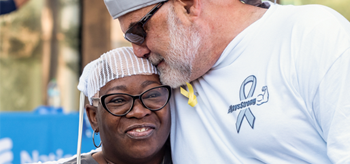In moments of crisis and uncertainty, members of the brain tumor community reach out to the National Brain Tumor Society’s Personalized Support and Navigation Program. This team empowers brain tumor patients and care partners with quality, unbiased information and resources.
How can the Personalized Support and Navigation Program help patients and caregivers?
- Provide clarity for the newly diagnosed:
- What should they know about their tumor type?
- What key questions should they ask their care team?
- What treatment options might be available to them?
- Which health centers specialize in neuro-oncology in their area?
- Provide support and resources throughout every stage in the brain tumor experience.
- Discuss clinical trial options for the patient based on their personal situation.
- Review brain tumor and treatment side effects with patients and their families with ways to help manage them. For example, Mary might suggest physical therapy for a patient who is now having a hard time walking. She may also provide tips on how to cope with fatigue.
- Explain the 2021 World Health Organization’s reclassification of brain tumors and what it means to them.
While the team cannot provide medical advice and direct patients and caregivers on which treatment to do or whether to stay with a health system, they can provide resources about what is the standard of care for the patient’s particular tumor type, information on clinical trials or share a small list of health care institutions that specialize in neuro-oncology near the patient.
The patient navigation team frequently hears from caregivers, who have been unexpectedly thrown into a new reality. A spouse, for example, may struggle with household finances that their partner typically managed. A parent may now juggle work and welcoming an adult child into their home who needs help with basic tasks.
Ultimately, the team aims to empower patients and their loved ones to take the next step to increase their quality of life and access the best treatments for their situation.
To connect with our Personalized Support and Navigation Program, please email patientnavigator@braintumor.org. Our helpful team will respond to your questions and provide you with the personalized information and support you need.


